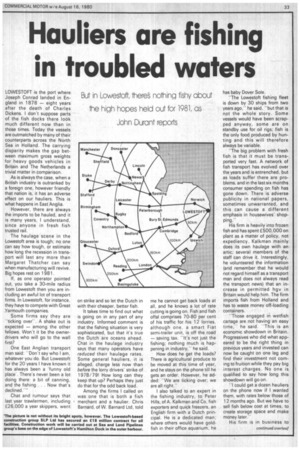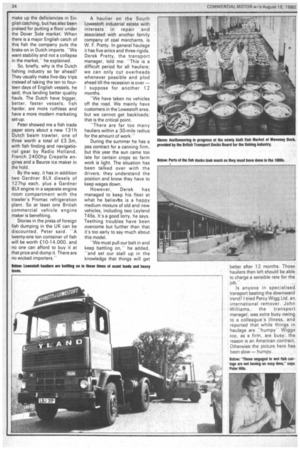Hauliers are fishing in troubled waters
Page 35

Page 36

If you've noticed an error in this article please click here to report it so we can fix it.
in Lowestoft, -1-)ere nothing fishy about the high hopes held out for 1981, as
John Durant reports
LOWESTOFT is the port where Joseph Conrad landed in England in 1878 — eight years after the death of Charles Dickens. I don't suppose parts of the fish docks there look much different now than in those times. Today the vessels are outmatched by many of their counterparts across the North Sea in Holland. The carrying disparity makes the gap between maximum gross weights for heavy goods vehicles in Britain and The Netherlands a trivial matter in comparison.
As is always the case, when a British industry is outranked by a foreign one, however friendly that nation is, it has an adverse effect on our hauliers. This is what happens in East Anglia.
However, there are always the imports to be hauled, and it is many years, I understand, since anyone in fresh fish trusted rail.
The haulage scene in the Lowestoft area is tough; no one can say how tough, or estimate how long the recession in transport will last any more than Margaret Thatcher can say when manufacturing will revive. Big hopes rest on 1981.
If, as one operator pointed out, you take a 30-mile radius from Lowestoft then you are including an awful lot of transport firms. In Lowestoft, for instance, they have to compete with Great Yarmouth companies.
Some firms say they are "ticking over-, A shake out is expected — among the other fellows. Won't it be the ownerdrivers who will go to the waIl first?
One East Anglian transport man said: "Don't say who I am, whatever you do. But Lowestoft for the 20 years I have known it has always been a 'funny old place". There's never been a lot doing there: a bit of canning, and the fishing . . . Now that's declined."' Chat and rumour says that last year trawlermen, including £26,000 a year skippers, went
on strike and so let the Dutch in with their cheaper, better fish.
It takes time to find out what is going on in any part of any industry. Informed comment is that the fishing situation is very sophisticated, but that it's true the Dutch are oceans ahead. Chat in the haulage industry says that many operators have reduced their haulage rates. Some general hauliers, it is alleged, charge less now than before the lorry drivers' strike of 1978/79! How long can they keep that up? Perhaps they just do that for the odd back load.
Among the firms I called on was one that is both a fish merchant and a haulier. Chris Barnard, of W. Barnard Ltd, told me he cannot get back loads at all, and he knows a lot of rate cutting is going on. Fish and fish offal comprises 70-80 per cent of his traffic for his 12 lorries, although one, a smart Fiat semi-trailer unit, is off the road — saving tax. "It's not just the fishing; nothing much is happening in industry," he said.
How does he get the loads? There is agricultural produce to be moved at this time of year, and he stays on the phone till he gets an order. However, he added: "We are ticking over; we are all right.
I also talked to an expert in the fishing industry, to Peter Hills, of A. Kalkman-and Co, fish exporters and quick freezers, an English firm with a Dutch principal. He is a dedicated man; where others would have goldfish in their office aquarium, he
"The Lowestoft fishing fleet is down by 30 ships from two years ago,he said, "but that is not the whole story. Some vessels would have been scrapped anyway, some are on standby use for oil rigs: fish is the only food produced by hunting and this will therefore always he variable.
"The big problem with fresh fish is that it must be trans-, ported very fast. A network of fish transport has evolved over the years and is entrenched, but as loads suffer there are problems, and in the last six months consumer spending on fish has gone down. There is adverse publicity in national papers, sometimes unwarranted, and this can cause a different emphasis in housewives" shopping."
His firm is heavily into frozen fish and has spent £500,000 on plant as a matter of policy, not expediency. Kalkman mainly does its own haulage with an artic; several members of the staff can drive it. Interestingly, he volunteered the information (and remember that he would not regard himself as a transport man and does not always read the transport news) that an increase in permitted hgv in Britain would help him. The firm Imports fish from Holland and has to waste money off-loading containers.
-Those engaged in wetfish cartage are not having an easy time,'" he said. -This is an economic showdown in Britain. Progressives who did what appeared to be the right thing in previous years and invested can now be caught on one leg and find their investment not coming to fruition while they pay big interest charges. No one is qualified to say how long this showdown will go on.
"I could get a dozen hauliers on the phone now if I wanted them, with rates below those of 12 months ago. But we have to sell fish below cost at times, to create storage space and make money later.
His firm is in business to continued overleaf make up the deficiencies in English catching, but has also been praised for putting a floor under the Dover .Sole market. When there is a major English catch of this fish the company puts the brake on in Dutch imports. "We want stability and not a collapse in the market,he explained.
So, briefly, why is the Dutch fishing industry so far ahead? They usually make five-day trips instead of taking the ten to fourteen days of English vessels, he said, thus landing better quality hauls. The Dutch have bigger, better, faster vessels, fish harder, are more ruthless and have a more modern marketing set-up.
Peter showed me a fish trade paper story about a new 131ft Dutch beam trawler, one of three worth a total of £3.3m, with fish finding and navigational gear by Radio Holland, French 2400hp Crepelle engines and a Beurze ice maker in the hold.
By the way, it has in addition two Gardner 6LX diesels of 127hp each, plus a Gardner 8LX engine in a separate engine room compartment with the trawler's Promac refrigeration plant. So at least one British commercial vehicle engine maker is benefiting.
Stories in the press of foreign fish dumping in the UK can be discounted, Peter said. "A twenty-one ton container of fish will be worth El 0-14,000, and no one can afford to buy it at that price and dump it. There are no wicked importers."
A haulier on the South Lowestoft industrial estate with interests in repair and associated with another family company of coal merchants, is W. F. Pretty. In general haulage it has five artics and three rigids. Derek Pretty, the transport manager, told me: "This is a difficult period for all hauliers; we can only cut overheads whenever possible and plod ahead till the recession is over — I suppose for another 12 months.
''We have taken no vehicles off the road. We mainly have customers in the Lowestoft area, but we cannot get backloads; that is the critical point.
"There are far too many hauliers within a 30-mile radius for the amount of work."
During the summer he has a pea contract for a canning firm, but this year the sun came too late for certain crops so farm work is light. The situation has been talked over with the drivers; they understand the position and know they have to keep wages down.
However, Derek has managed to keep his fleet at what he believts is a happy medium mixture of old and new vehicles, 'including two Leyland T45s. It's a good lorry, he says. Teething troubles have been overcome but further than that it's too early to say much about this model.
-We must pull our belt in and keep battling on," he added, "and set our stall up in the knowledge that things will get
better after 12 months. Those hauliers then left should be able to charge a sensible rate for the job."
Is anyone in specialised transport beating the downward trend? I tried Percy Wigg Ltd, an international remover. John Williams, the transport manager, was extra busy owing to a colleague's illness, and reported that while things in haulage are "humpy" Wiggs too, as a firm, are busy: the reason is an American contract. Otherwise the picture here has been slow — humpy.












































































































